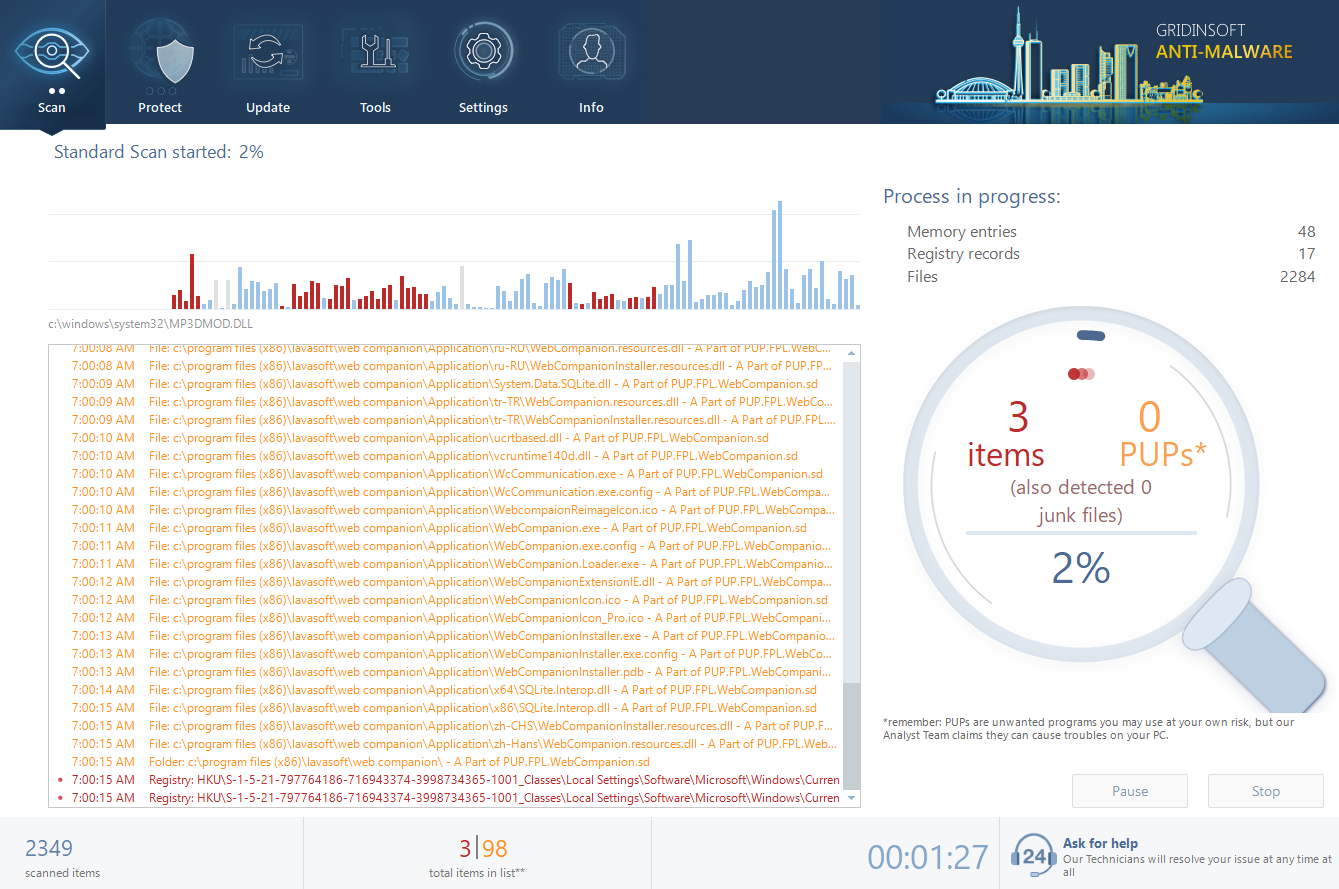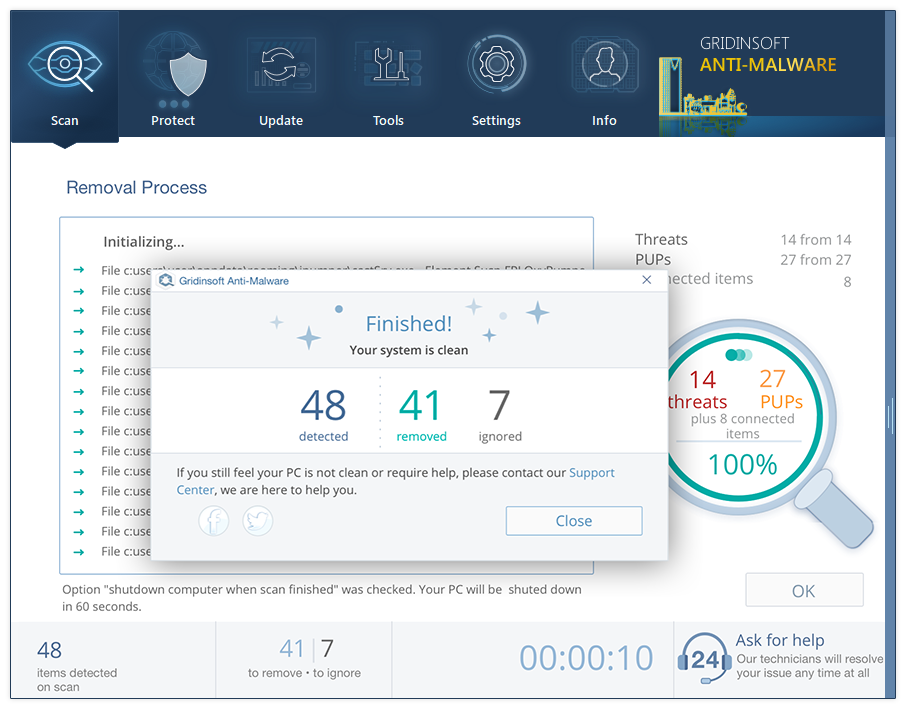Muggle Stealer is a malware that has been developed using the Go programming language. The Muggle can steal passwords, capture screenshots, and gather certain system information. It is crucial to remove Muggle from infected operating systems as soon as possible.
Muggle Stealer gains access to network credentials of infected systems by secretly collecting WiFi passwords. This allows cybercriminals to potentially eavesdrop on network activities or carry out unauthorized activities, compromising the security of the affected network and putting sensitive user information at risk.
The risks posed by Muggle are further heightened by its ability to capture browser passwords. By obtaining these credentials, the malware can access users’ online accounts, including email, social media, and financial platforms. This opens the door for identity theft, financial fraud, and unauthorized access to sensitive personal data.
Moreover, the capability of Muggle to capture screenshots raises serious privacy concerns. It enables cybercriminals to gain visibility into a user’s screen activities, potentially compromising confidential information such as personal conversations, banking transactions, or private documents.
Furthermore, Muggle’s theft of disk information allows attackers to gather critical system details and potentially exploit vulnerabilities in the infected system. This information can be leveraged for further attacks or sold on the black market, exposing users to various cyber threats.
Overview of Muggle Stealer
| Name | Muggle Stealer |
| Detection | Trojan:Win64/MuggleStealer.DA!MTB |
| Damage | Steal passwords, capture screenshots, and gather certain system information |
| Fix Tool | See If Your System Has Been Affected by Muggle Virus |
Information stealers are designed to collect sensitive data from infected systems, including login credentials, financial information, personal documents, and browsing history. Their primary objective is to gather valuable information that can be exploited for financial gain or malicious activities.
Additionally, information stealers often employ sophisticated techniques to operate stealthily and avoid detection. Other examples of information-stealing malware include Phemedrone, Wise Remote, and ThirdEye.
Muggle Stealer
309aef472f49e47a5908ca062df7fe9b
– Go based Stealer
– Collects WIFI & browser password, Screenshot, Disk Info
– Exfiltrate data to 49.232.241[.]188 [Chinese IP 🇨🇳]#MuggleStealer #Stealer #IOC https://t.co/RcZwZ7G8HQ pic.twitter.com/u7HMg5IXmS— Yogesh Londhe (@suyog41) July 10, 2023
How did Muggle infiltrate my computer?
Malware infections can occur when users unknowingly execute malicious code or download infected files. These infections can happen through actions such as clicking on malicious links, downloading infected files, opening malicious email attachments, visiting compromised websites, clicking on malicious ads, or using cracking tools or pirated software.
These activities are among the most common ways users unknowingly introduce malware into their computers.
How to prevent malware installation?
To avoid malware installation, it is crucial to utilize reputable antivirus or anti-malware software and keep it up to date to detect and block potential threats. Be cautious about the websites you visit and avoid clicking on suspicious links or downloading files from questionable sources. Regularly update your operating system and installed programs.
Stay vigilant against unsolicited emails and only obtain files and software from trusted sources such as official websites and legitimate stores. If you suspect that your computer is already infected, we highly recommend running a scan with Gridinsoft Anti-Malware to automatically eliminate infiltrated malware.
How to remove the Muggle from my PC?
Muggle malware is very hard to remove manually. It puts its files in a variety of places throughout the disk, and can restore itself from one of the parts. In addition, numerous modifications in the windows registry, networking configurations and also Group Policies are quite hard to identify and change to the original. It is much better to use a specific tool – exactly, an anti-malware program. GridinSoft Anti-Malware will definitely fit the best for virus removal goals.
Why GridinSoft Anti-Malware? It is pretty light-weight and has its detection databases updated almost every hour. In addition, it does not have such bugs and exposures as Microsoft Defender does. The combination of these details makes GridinSoft Anti-Malware suitable for clearing away malware of any kind.
Remove the Muggle with GridinSoft Anti-Malware
- Download and install GridinSoft Anti-Malware. After the installation, you will be offered to perform the Standard Scan. Approve this action.
- Standard scan checks the logical disk where the system files are stored, together with the files of programs you have already installed. The scan lasts up to 6 minutes.
- When the scan is over, you may choose the action for each detected virus. For all files of Muggle the default option is “Delete”. Press “Apply” to finish the malware removal.



Frequently Asked Questions (FAQ)
Muggle Stealer is a type of malware developed using the Go programming language. It is designed to steal sensitive information from infected systems, such as passwords, system details, and screenshots.
Muggle Stealer compromises your system’s security by collecting WiFi passwords, allowing cybercriminals to potentially eavesdrop on network activities or carry out unauthorized activities. It can also capture browser passwords, providing access to your online accounts and putting your personal information at risk.
The risks associated with Muggle Stealer include identity theft, financial fraud, unauthorized access to sensitive personal data, and potential exposure of confidential information captured through screenshots. Additionally, the theft of disk information by Muggle Stealer can lead to further attacks or the sale of critical system details on the black market.
To protect your computer from Muggle Stealer and similar malware:
- Use reputable antivirus or anti-malware software and keep it up to date.
- Avoid clicking on suspicious links or downloading files from questionable sources.
- Regularly update your operating system and installed programs.
- Be cautious of unsolicited emails and only obtain files and software from trusted sources.
- If you suspect your computer is infected, run a scan with Gridinsoft Anti-Malware to automatically eliminate infiltrated malware.
Information stealers are types of malware designed to collect sensitive data from infected systems. They target login credentials, financial information, personal documents, and browsing history. The stolen information can be used for financial gain or malicious activities.
Yes, Muggle Stealer can be detected and removed using reputable antivirus or anti-malware software. Running a thorough scan on your system can help identify and eliminate the malware.
Yes, there are other information-stealing malware similar to Muggle Stealer, such as Phemedrone, Meduza, and ThirdEye. These malware variants also aim to gather sensitive information from infected systems.
Muggle Stealer can infiltrate your computer when you unknowingly execute malicious code or download infected files. This can occur through actions such as clicking on malicious links, opening malicious email attachments, visiting compromised websites, or downloading files from untrustworthy sources.
A Muggle Stealer infection can lead to compromised network security, unauthorized access to online accounts, identity theft, financial fraud, exposure of private conversations and documents, and potential exploitation of system vulnerabilities.
If you suspect your computer is infected with Muggle Stealer or any other malware, it is recommended to contact a cybersecurity professional or report the incident to your local authorities. They can provide guidance on the appropriate steps to take to mitigate the issue and protect your information.
How to Remove Muggle Malware
Name: Muggle
Description: Muggle Stealer compromises your system's security by collecting WiFi passwords, allowing cybercriminals to potentially eavesdrop on network activities or carry out unauthorized activities. It can also capture browser passwords, providing access to your online accounts and putting your personal information at risk.
Operating System: Windows
Application Category: Malware


